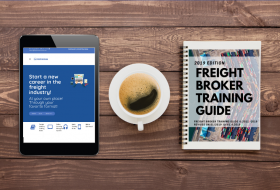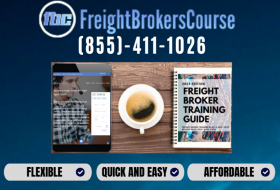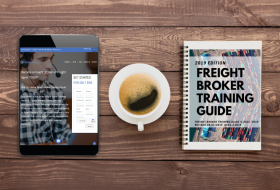Every day independent freight brokers help cargo companies find the best transportation to move our nation’s products from city to city, state to state and internationally. Independent freight brokers work on their own without the security and support of a larger business structure. Brokers negotiate their own contracts and are paid directly by the freight company. Becoming an independent freight broker requires not only training in the freight industry but a federal license and registration as a business entity with the state.
What do you need to become a freight broker?
One key to running any successful business is to know what potential customers are looking for. So here’s a summary of what those trying to find freight brokers want to see:
- Proper licensing – Nothing scares potential clients away more than the fear that you might be shady. And that’s exactly what they’ll think if you don’t have a license from the Federal Motor Carrier Safety Administration. Amazingly, some brokers try to operate without this all-important piece of paper. That puts them at risk, and serves as a red flag for potential clients. So, if you haven’t got your FMCSA license yet, get it right away.
- Multiple modes – The best brokers offer more than just OTR tractor-trailer services. Sometimes freight must go by flatbeds, reefers, train, padded van, or air. If you have connections with these carriers, you’ll quickly become the brokerage of choice for clients who need to utilize these different options.
- Choose the carriers you work with carefully – Anyone familiar with the trucking industry knows that there are people out there operating rigs with no insurance or CDL. Your customers don’t want anything to do with them and neither should you. Make certain that all drivers you work with have their ducks in a row before offering them a contract.
- Use e-mail to stay in touch with drivers – Clients will want to know how you match carriers to particular loads. They also want to know that you can confirm the freight was picked up and delivered according to the agreement. The best way to assure them that you’re on top of this is to keep written records of your contact with the driver. In this electronic age, the best way to do that is with e-mail. Of course phone conversations are fine too, but back up agreements with something that can be printed out or sent to clients.
- Good credit counts – No one wants to work with a business that’s on the verge of bankruptcy. Potential clients will want to know that you pay your vendors on time, and that you don’t have any liens or judgments against your brokerage. Make sure you are paying your bills in full and as promptly as possible, and you’ll come out ahead in the long run.
- How long you’ve been in business matters – This is one of the unpleasant facts that new brokers must face. You may possess all the necessary paperwork. You might be totally honest and have an extensive network of reliable, experienced carriers. But if you just hung out your shingle yesterday, so to speak, you’re still going to be viewed with suspicion by those looking to find freight brokers. You can partially compensate for this in several ways:
- Don’t bring up the age of your business unless you’re asked about it.If you are asked, emphasize the positives. If you were a professional driver for 20 years before becoming a broker, tell them that. If you’ve completed training programs that give you an edge over more established brokerages, mention that as well. If all else fails, then compete on price. Charge less than older businesses, at least until you’ve proven yourself.
- Seek clients among smaller or highly specialized companies. the big boys often overlook these clients, and they may be more willing to work with a new broker. They’ll have fewer loads for you, but they’re a fantastic way to build your reputation. When they see you treat your clients right, they’ll give you positive word of mouth with their contacts.
- Join professional associations – The Transportation Intermediaries Association (TIA) is the “Better Business Bureau” of freight brokers. To be a member, you must abide by a strict code of ethics. Joining the TIA or similar groups shows that you’re serious about running your business properly, which clients love to see.
Of course none of these suggestions will do you much good if you’re not properly organized. This is just a short guidelines for you to know what are the things needed to start your own freight brokerage business.







